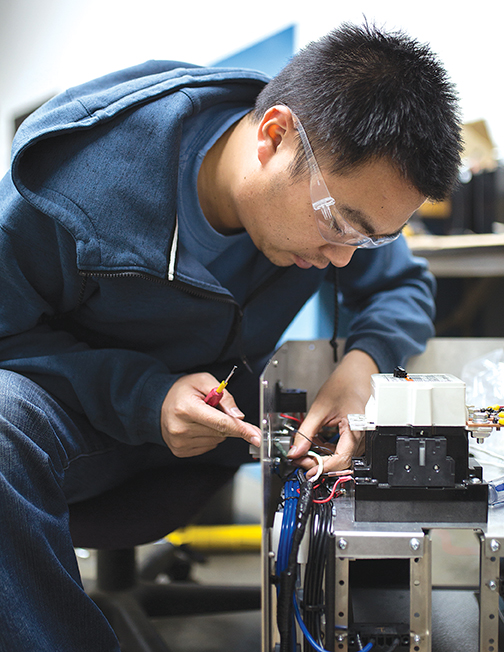
Complete Coach Works, Transit Sales International, Shuttle Bus Leasing and ZEPS offer a “one-stop shop” for operators to enhance their vehicles and operations
By Richard Tackett
“The beginning of Complete Coach Works was all about seizing opportunities,” says Dale Carson, now president of Complete Coach Works (CCW). After his father Dave sold his business to Hausman Bus Sales in 1977, he was retained in shop operations and worked in Southern California and Mississippi until 1983 when the company shipped him to Hawaii for a major bus rehabilitation project.
After the project ended in 1985, Carson found himself with a lot of idle time, and arriving at a fork in the road in his career.
“I’d been gone for nearly three years and wasn’t willing to move to Chicago [where the company was headquartered], so I quit without much thought of what to do next. I wasn’t overly worried about it. In fact, that’s when I opened Complete Coach Works (CCW) on a project-to-project basis – finding contracts, bidding on them and doing the work,” Carson says.
Carson was drawn to bus rehabilitation and refurbishment, dating back to his time at Hausman where he oversaw multiple rehabilitation projects, including a contract for 91 buses in Honolulu, Hawaii. For Carson, the projects tapped into his skills and strengths. “My background is mechanical, so I like starting jobs and finishing them,” he says.
Humble beginnings
To that end, CCW’s first contract came in 1986 when the Orange County Transportation Authority (OCTA) in Southern California wanted to retrofit air conditioning and exhaust systems on 175 Rapid Transit Series buses manufactured by GMC. Carson’s team made a successful bid, and CCW started in earnest.
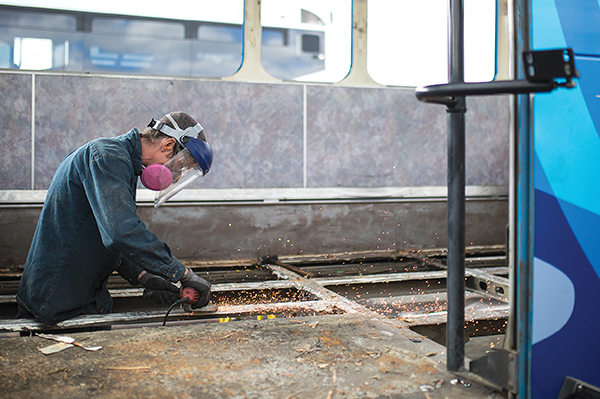 From that point, CCW continued to bid on other on-site work projects (including contract management and painting buses), run through subcontractors. It wasn’t until the company won a contract with UCLA in 1989 for rebuilt vehicles that it needed its own facility – a small space in Riverside, CA, which worked well until CCW expanded further in 1993.
From that point, CCW continued to bid on other on-site work projects (including contract management and painting buses), run through subcontractors. It wasn’t until the company won a contract with UCLA in 1989 for rebuilt vehicles that it needed its own facility – a small space in Riverside, CA, which worked well until CCW expanded further in 1993.
“The opportunity arose for us to acquire new property in Riverside, which is the facility we still use today,” Carson says. “We thought we’d died and gone to heaven! It came with more space than we thought we’d ever need – on almost 10 acres.”
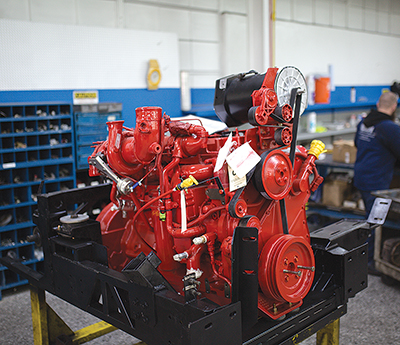 Of course, CCW continued to expand with new capabilities and contracts to fill the space. Since purchasing the Riverside facility, CCW has acquired two neighboring properties and now occupies nearly 15 acres.
Of course, CCW continued to expand with new capabilities and contracts to fill the space. Since purchasing the Riverside facility, CCW has acquired two neighboring properties and now occupies nearly 15 acres.
Today, the company has satellite facilities in northern California; Wisconsin; Arizona; Memphis, TN; El Paso, TX; Del Rio, TX; Laredo, TX; and San Benito, TX.
Expanding capabilities
Complete Coach Works has grown to encompass a catalogue of capabilities. Through CCW itself or one of its sister companies, Carson’s team represents a “one-stop shop” for operators with a variety of needs.
Repair, remanufacturing and rehabilitation
CCW’s bread-and-butter repertoire since its inception is remanufacturing, rehabbing and repairing buses:
• CCW has the capability to fully remanufacture transit buses, adding enhancements like new wheelchair ramps, destination signs, multiplexing, bike racks, and restraint systems.
The company specializes in accident and fire repair. CCW takes on large-scale and expensive repairs that local body shops cannot or should not handle. Their projects range from replacing the entire front-end of a vehicle damaged in a collision, to repairing and replacing fire-damaged electric componentry.
“Extensive bus repairs require intimate knowledge of buses and how they work,” Carson says. “We have that knowledge thanks to our years of experience and expertise.”
• CCW offers a variety of upgrades for interior rehabs, including seat re-upholstery and complete interior rehabilitation.
• CCW has recently seen an increase in requests for alternative fuel conversions, replacing diesel engines with CNG, LNG, propane or hybrid-drive power systems. Carson says the company is well-equipped to help agencies transition their fleets to clean-burning fuels.
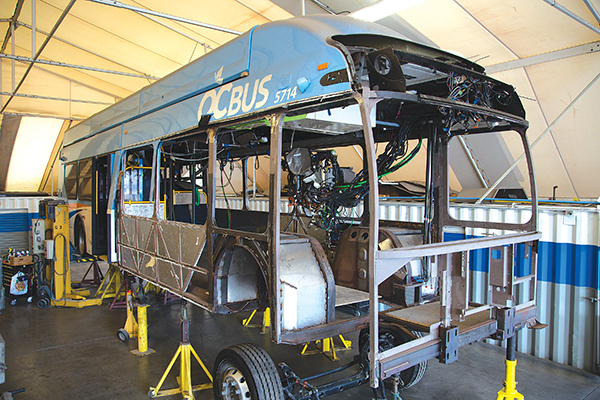
Used vehicle sales and leasing
Transit Sales International (TSI), an affiliate of CCW, has specialized in selling used transit buses since Carson purchased an order of used buses in 1987. The company grew alongside CCW as a natural outgrowth of the remanufacturing business.
“We buy as many buses as we can, and we focus on reliable Western coaches,” Carson says.
Carson says that TSI’s inventory of roughly 1,000 buses is perfectly suited for transit agencies that need large fleets of quality, affordable and identical bus models.
Shuttle Bus Leasing (SBL) grew naturally from the success of TSI. With such a large inventory of buses to sell, Carson says the company wanted to give operators the opportunity to lease. Models available for leasing range in capacity from 15 to 120 passengers, with leases formatted for each applicant.
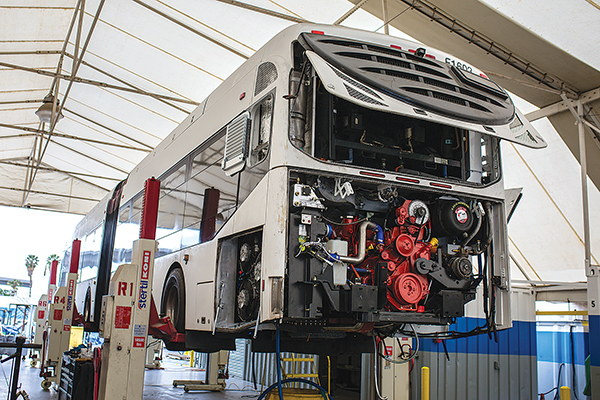
The future is zero-emission
Electric conversion of buses is the latest and perhaps most important development at CCW. The company says its all-electric Zero Emission Propulsion System (ZEPS) and the ZEPS remanufactured transit bus can save agencies hundreds of thousands of dollars in fuel and maintenance costs over the life of the system.
The system itself uses high energy density lithium ion NMC battery packs, enabling a reduction in battery pack weight and overall vehicle weight. Because of this, the patented ZEPS bus has a similar weight and weight distribution to its OEM counterparts.
CCW calculates that an agency’s total annual cost of fuel per bus will be reduced by over 70 percent with electric propulsion. With a 12-year life cycle cost calculation, total lifetime cost savings over a diesel bus are more than 60 percent.
The buses have a single-charge range of 150 miles.
“We’ve received so much positive feedback about ZEPS,” Carson says. “It has accomplished our goal, to have a zero-emission system which we can retrofit into any bus.”
CCW has deployed ZEPS-powered vehicles to 10 different transit properties, the largest being the Indianapolis Public Transportation Corporation’s (IndyGo) fleet of 21 buses. IndyGo’s fleet has a combined mileage of over 1 million.
Another notable deployment is in McAllen, TX, with the fleet of McAllen Metro. McAllen Metro runs its two ZEPS vehicles using the Wireless Advance Vehicle Electrification (WAVE) charging system. WAVE charges buses through the air, using an embedded charging pad in the pavement underneath a vehicle.
“WAVE allows buses to charge on their routes and allows the vehicles to operate with less onboard power storage,” Carson says. “I firmly believe this is the way of the future and that all agencies will eventually charge their zero-emission buses with this method.”
Always serving the industry
Carson says his team is motivated about informing the industry that Complete Coach Works and its affiliated companies have the capability to service a variety of needs.
“We have tremendous opportunities for agencies to save money and extend the lives of their vehicles – whether that be through affordable sales and leasing; remanufacturing and rehabilitation; efficient and thorough repair; and full conversion to an all-electric or a cleaner-burning bus,” Carson says.
“We will continue to offer these services, because they’re what the industry has shown that it needs. And we’ll continue to monitor the industry’s needs – so we can see where it’s going and how we can help get it there.”
